From South Africa, Lessons In 'Soft Vengeance'
南アフリカ共和国の、「ソフトな復讐」の教訓から学ぶ
アパルトヘイトも随分昔の話に思えてきますが、1994年までは人種差別政策は、この国では合法的だったのですね。実は、そんなに昔のことでは無いのです。
by Nina Totenberg
November 25, 2011

South African Constitutional Court Judge Albie Sachs, seen here in Johannesburg in 2009, resisted the impulse to take revenge on the bomber who cost him his right arm. 2009年、ここヨハネスブルクの南アフリカ憲法裁判所判事 アルビー・サックスは彼の右腕の奪った爆撃に対する報復に駆られる気持ちを抑えている。
November 25, 2011
Sometimes in the life of a reporter, you meet a person so extraordinary, so interesting, that you want to share that experience with others. Such is the case with Albie Sachs, whom I met while on vacation in South Africa.
記者の人生では時々、他の人ともこの経験を分かち合いたいと思うような、物凄い人物、興味ある人物に出会うことがあります。 南アフリカで休暇中に会ったアルビ―・サックスもその一人です。
Sachs has led a remarkable life, moving from freedom fighter to founding father. Once imprisoned, tortured and exiled, he later helped write the South African Constitution and was appointed by Nelson Mandela to serve on the nation's Constitutional Court, analogous to our Supreme Court. In his spare time, he has authored 10 books, including his latest, The Strange Alchemy of Life and Law.
サックスの人生は驚くべきものです、自由の戦士から建国の父と呼ばれるまでの人生を送っています。 かつて、投獄され、拷問にあい、亡命した彼は、後に南アフリカの憲法起草に関与し、ネルソン・マンデラ氏に任命され、国の憲法裁判所(最高裁判所に相当)で働き。同職務の傍らで、彼は10冊もの本を著し、その中の最新刊は「人生と法律の不思議な力」というものです。
But I am getting ahead myself. Let's start at the beginning.
先を急ぎましょう。 それでは始めます。
Albie Sachs is white and Jewish, the son of trade union activists. He first became involved in the anti-apartheid movement more than 60 years ago when he was a 17-year-old college student. He graduated with a law degree and went on to represent many of the African National Congress activists who were imprisoned, tortured and even sentenced to death for their political activities.
Eventually, the authorities came for him too. In 1963, he was arrested without charge and put in solitary confinement for six months. Three years later he was arrested again, interrogated and tortured. This time when he was released, he fled the country and spent the next 24 years in exile, much of it in Mozambique, where he taught law at the university and worked with leaders of the African National Congress to bring down the white South African government.
アルビ‐・サックスは白人のユダヤ人であり、貿易組合の活動家の息子として生まれました。 彼は17歳の大学生の時、即ち今から60年以上も前の反アパルトヘイト運動に初めて参加します。 彼は法学部を卒業して、アフリカ民族会議の多くの活動家を代表するようになります。彼らの多くは、その政治的な活動により投獄され、拷問され、そして死刑に処せられました。
当然ながら、彼の所にも官権がやってきました。 1963年に、彼は理由もなく逮捕され、6か月間も独房に投獄されました。 3年後に再び彼は逮捕され、尋問され拷問を受けました。 解放された後、彼は国を去り、24年間の亡命生活を送ります。もっぱら生活したのはモザンビークであり、そこの大学で法律の教鞭をとりながら、白人支配の南アフリカ政府を打倒するためにアフリカ民族会議の指導者として働きます。
'We Will Avenge You' 「我々はあなたの仇を討ちます。」
No anti-apartheid activist was safe in those days, even outside South Africa. Many were targets for assassination by the South African security forces. And in 1988, in Mozambique, a bomb placed in Sachs' car exploded, nearly killing him. Doctors managed to save his life, but his right arm was gone, and he was blinded in one eye. Later, he was transported to England.
"When I was lying in the London hospital, arm blown off, recovering the sight of my one good eye," he recalls, "I received a note from a friend of mine saying, 'We will avenge you,' and I felt very uncomfortable with that. We're going to cut off the arms of the people who did this? Are we going to blind them in one eye? What sort of a country is that? Is that what we're fighting for?"
What Sachs wanted instead, even for the men who had bombed his car, was what he calls "soft vengeance."
"Hard vengeance leaves you still at the level of the people who did these awful things," he explains. "Soft vengeance is the triumph of your life, of your ideals, of your goals."
当時は、反アパルトヘイト活動家は、南アフリカ国外でも身の安全は保障されていませんでした。多くの活動家が南アフリカの治安部隊の暗殺の標的とされました。 そして、1988年モザンビークでサック氏の車に仕掛けられた爆弾が破裂したのです、危うく死ぬところでした。 医者は彼の命を救いましたが、右腕は無く、そして片方の目を失いました。 その後彼はイギリスに移送されました。
「私がロンドンの病院で右腕を飛ばされて横になったまま、残った片方の目のリハビリを受けているときに友人からメモを受けとりました。そのメモには「我々は、君の仇を討つ」と書いてありました。それを見たとき私は非常に居心地の悪さを感じたのです。我々は犯人の腕を切断しようというのか?それとも、彼らの目を失明させたいのか? この国は一体どのような国なのだ? これが、我々が戦って勝ち取ろうとしているものなのか?
サックス氏が求めているのは、そうではなく、この爆弾犯に対してさえ、彼が言うところの「ソフト アベンジ(ソフトな仇討)」です。
「ハード・アベンジ(ハードな仇討)では、仇討をするあなたは、酷いことをした犯人と同じレベルに留まることになります。 これに対し、ソフト・アベンジ(ソフトな仇討)は人生の、理想の、そして人生の目標の勝利を意味するのです。」とサック氏は説明する。
Two years after the bombing, the South African government caved to international pressure, released Nelson Mandela after 27 years of imprisonment, recognized the ANC and other opposition groups, and began the process of negotiating a democratic transition to majority rule in an overwhelmingly nonwhite country. After 24 years in exile, Sachs returned home and was appointed to the committee charged with drafting a new constitution for a new nonracial state.
So, since he was one of the founding fathers, as it were, one of the framers of his country's constitution, I asked him about a question that has roiled the legal waters in the United States: What does he think of the notion of original intent as a way of figuring out what the constitution means?
He demurred as it applies to the United States, but when it comes to South Africa, Sachs says that even though he was what he calls "one of the original intenders," discerning intent is next to impossible.
その爆破から2年後、国際社会の圧力に屈した南アフリカ政府はネルソン・マンデラ氏を27年の投獄から解放し、アフリカ民族会議や他の野党を承認し、この黒人が圧倒的多数を占めるこの国で、多数決への民主的移行交渉に移行したのです。 24年に亘る亡命生活ののち、サックス氏は母国に戻り、新しい人種差別のない国家の新憲法の起草委員に任命されます。
彼は母国の建国の父の一人となったのです。そうです、彼の国の憲法の骨格を作り上げたメンバーとして。私は彼にアメリカで法曹界に波紋を投げかける質問をしました。 すなわち、憲法の意味するところのものを具現化するうえで、基となった思想の概念についてどのように考えているか?
彼はアメリカに適用することに留保しながらも、南アフリカについては、彼が憲法草案の創案者の一人と呼ばれているが、明晰な意図を炙りだして説明するのは殆ど不可能だと語った。
Original Intent 本来の意図
He describes the complicated, but typical, process of drafting, where "we would come up with a draft, and it would be commented on by others and go through different committees, and then it would be put in context and it would have neighboring clauses." In such a multifaceted process, he maintains, "It wasn't as though there was a meaning that we attributed to it and intended to be there for all time." Indeed, Sachs says that when he goes over the reams of old drafting documents these days, he is often surprised. "Oh gosh, is this what we had in mind? I didn't remember we crossed out certain words. In fact, as interesting as what appears in the final version would be what was dropped along the way. And there's usually very little record of that."
彼は複雑だが、典型的な憲法草案の過程について述べている。「我々はまず、起案して、多くの人に意見をもらい、更に他の委員会に諮り、そして、それを文脈に盛り込み、関連条項との擦り合わせをします。」 そのような多面的な過程を、いちいち彼が踏むことで、「それは、我々が永遠に残すことを意図し、吹き込んだ意味合いが、あたかも無くなるようだった。」 実際、最近になって、膨大な草案原稿に目を通していて、彼自身が驚くことがある。 「あれ? 何を考えていたのかな? ある文言を削除している理由が思い出せないのです。 実際、興味深いのは、草案の過程で削除したものが、最終版に残っていたりするのです。 そして、大概の場合、そこの記録は殆ど残っていないのです。」
Even the word "intent," he contends, is not clear. "What were you willing to concede from people on your side? From the other side, who saw the words differently?" And when there is disagreement, he observes, eventually, "a certain moment comes when you say, 'Enough, we've got to get on with the constitution.' "
There were, of course, some things that Sachs insisted on, among them a guarantee of no detention without trial. "It wasn't enough to simply guarantee the right to be brought before court within 48 hours," he says.
Instead, "we had to put in expressly, no detention without trial, because that was the weapon that was used" by the apartheid government "to detain thousands and thousands of us. It completely subverted the whole of criminal procedure. It made, in effect, the security police the arbiters of who were guilty, who were not."
意図という言葉自体の定義も明確ではないと彼は主張する。 「自分の意見に賛同する人に喜んで妥協させ、別の解釈をする人から譲歩を引き出すかです。」 そして同意に至らなかった場合、彼はある時点で、こう言うのです。「十分に議論しつくしました。 我々はとにかく憲法との折り合いをつけていきましょう。」
そこには、もちろんサックス氏が拘ったものがあります。 その一つに法廷での審理を経ないで身柄を拘束されないという保証です。「48時間以内裁判に諮るという権利を単に保証するだけでは十分ではありませんでした。」と彼は言う。
そうではなく、「裁判なしでは絶対に身柄を拘束されないということを明示する必要がありました。なぜなら、それはアパルトヘイトの政府が使った武器だったからです。何千人もの数えきれない人々が拘束されたのです。 これにより治安警察に、有罪かそうでないかを審判する権限を与えていた、それまでの刑事訴訟の全体を完全に覆したのです。
A New Dawn 新しい夜明け
At every stage, says Sachs, the transition to a nonracial democracy was difficult. Even at the new Constitutional Court, where the new justices had to decide whether an accused offender should be prosecuted under the old apartheid-era law that existed at the time of the crime, or under the new law.
"I remember the head of our court going around the table, and he asked one judge, 'What do you think?' " The judge replied that under the transition provisions of the constitution, "the literal meaning is quite clear. It's unfortunate, but it's just temporary."
The other justices seemed to agree. Until it came time for Sachs to speak. "No," he blurted out, but by his own account, he choked on his words, unable to articulate a reason. "I just knew something was wrong," he recalls.
人種差別のない民主主義への移行の各段階は非常に困難が多かったとサックスは言う。 新しい憲法裁判所ですら、新しい判事が被告人加害者を、その犯罪が起きたときのアパルトヘイト時代の法律の下で裁くべきなのか、或いは新しい法律に基づくべきなのかを決めなければならなかった。
「私は我々の裁判所長がテーブルを回りながら、一人の判事に「あなたはどう思うか?」と尋ねたのを覚えています。 その判事は、現行(暫定)の法律下でと答えました。理由は「文言が明確で、残念ではあるが、これは一時的で仕方がない。」というものでした。」
他の判事もこれに同意しているように見えました。 しかし、サックス氏が問われる番になって、彼は思わず「それはダメです」と突っぱねたのですが、彼はその説明をする段になって、口ごもってしまったのです、明確に説明することが出来なかったからです。 「しかし、何かが間違っていると直感で感じたのです。」と彼は当時を回想する。
"This constitution was a new dawn. It was a total rupture with the old order, and the idea that the old way of doing things, the racist, authoritarian way, could seep into the future, even for a minute, to my mind just seemed to violate the whole meaning of the constitutional moment." Sachs' dilemma was quickly solved when the other justices spent more time discussing the issue, and after much mulling, the Sachs view prevailed by a 7-to-4 vote.
A new and fair system of justice is one thing. But a visitor to South Africa can't help but wonder about a more visceral justice, and why it is that after so many decades of brutal oppression, the nonwhite majority did not, in fact, take vengeance on the white oppressors.
Sachs' answer to that question is complicated. It combines the Gandhi tradition of nonviolence, which started when Gandhi lived in South Africa, with the British tradition of judicial fairness, and the decades-long struggle by Nelson Mandela, Oliver Tambo and other leaders whose aim was a nonracial society.
「この新しい憲法は、この国の新しい夜明けを意味していた。 それは、将来にまた染み込むかも知れない旧秩序、古いやり方、人種差別主義者、権威主義的やり方を一掃するものだったし、だからこそ私には、それは例え一瞬といえども憲法の全体の重要な意義に反しているように思えたのです。」 サックスの、このジレンマは、他の判事たちが、この問題を討議するのにより多くの時間を割き熟考することによりすぐに解決されました。 サックスの見解が投票の結果賛成7、反対4で採用されたのです。
新しい、公平な司法のシステムは、それは良い一つのこととして理解できますが、南アフリカを訪れた者はどうしても、もっと直截な正義について不思議に思わざるを得ません。つまり何十年にも及ぶ残酷な抑圧を経験していながら、圧倒的多数を誇る黒人の人々は、実際、その白人の抑圧者たちに復讐をしないのでしょうかということです。
その疑問に対するサックス氏の答えはいささか込み入っています。 それはガンジーが南アフリカに住んでいる時に始まったガンジーの非暴力主義の伝統と、イギリスの司法の公正さの伝統と、人種不差別社会を目標としたネルソン・マンデラ、オリビア・タンボ、そして他の指導者達の何十年にも亘る努力が一体となったものだというのです。
"We want to prove to our fellow South Africans, we want to prove to the world, that black and white can live together. This was like a vision, an aspiration," Sachs says. He describes "a kind of ache to get beyond divisions." And at rock bottom, there was the realization that neither whites nor nonwhites could survive alone. "We actually needed each other," he observes. Whites had capital and skills that would help the new South Africa grow and prosper. And nonwhites, who were then about 90 percent of the population, needed that capital and needed to learn those skills to build a new nonracial system of education, housing and health care that would deliver to them the very things they had been deprived of. So could people who suffered during the apartheid era really just forgive and forget? "Forgive, yes. Forget, no," says Sachs.
「我々は南アフリカの同胞のみならず、世界に対して、黒人と白人が共にやっていけることを証明したいのです。 これは夢であり、大きな望みでもあります。」とサックスは述べ、「亀裂を乗り越えていく痛みのようなものです。」とその著書に記している。 「そして根底には、黒人も白人も一方だけでは生きていけないという認識がありました。 「我々は実際のところ、相手を必要としていたのです。」と彼は見ている。 白人は資本と技術を有し、南アフリカの経済成長と繁栄を助けることが出来るし、一方の黒人はこの国の人口の90%を占めており、彼らが奪われてきた教育制度、住宅そして福利厚生など、彼らに還元する不差別の新しい社会システムを構築するためにも、白人の資本と技術を必要としています。 だからアパルトヘイトの時代に、酷い差別に苦しんだ黒人は本当に、これまでのことを許し、忘れることが出来るのですか?と問うと。 サックス氏は答えました「許すけど、忘れない。」
Seeking Forgiveness 許しの探求
In that vein, Sachs recalls his meeting with one of the men who planted the bomb in his car. His name was Henri, an officer of the security forces, who came to see Justice Sachs in his court chambers, to seek forgiveness. The two men talked for a long time, until Sachs finally ended the meeting with these words: "Normally when I say goodbye to somebody, I shake their hand. I can't shake your hand. Go to the Truth Commission, tell them what you know, and who knows, maybe one day we'll meet [again]." After that, Sachs forgot about the man who tried to kill him. But many months later, when the justice was at a large, raucous party, he heard a voice saying, "Albie." Looking around, he heard "Albie" again. "And by god," Sachs recalls, "It's Henri."
その話の流れで、サックス氏は彼の車に爆弾を仕掛けたメンバーの一人との出会いを思い出している。彼の名前はヘンリと言い、かつての治安部隊の幹部であり、許しを求めて彼の裁判官室に来たのである。 二人は長い時間話しあい、最後にサックス氏がこう言って話を切り上げた「通常、私は誰かと別れるときは、その人と拍手をしますが、あなたと握手することは出来ません。 すぐに真実委員会に出頭して、彼らに知っていることと、誰が知っているかを洗いざらい話しなさい。多分また、いつかお会いすることもあると思います。」 その後、サックス氏は、自分を殺そうとした、その男のことを忘れてしまっていた。 しかし、何か月も経ったある日、サックス氏が大きな、騒々しいパーティに参加していた時のこと、アルビと呼ぶ声に、周りを見回すと、またアルビと呼ぶ声がしました。 「なんと声の主はヘンリだったのです。」
The two men found a quiet corner, and Henri told him that he had in fact gone to the Truth and Reconciliation Commission and told them everything he knew. "And I said, 'Henri, I've only got your face to tell me what you're saying is the truth,' and I put out my left hand and shook his hand," Sachs recalls. "He went away absolutely elated, and I almost fainted. It was a real shock to me. But I heard afterwards that he had been dancing around and suddenly left the party and went home and cried for two weeks. And that moved me. I'm not Henri's friend. I don't want to go to a movie with him, but we are starting to live in the same country, and to me, that's more meaningful than if he'd been sent to jail."
二人は静かな場所に移動し、ヘンリは彼に、実際に真実と和解委員会に出向いて、知っていることを全て話したと言いました。 「そこで、私はあなたの顔を見るだけで、あなたが言っていることは真実だとわかる。 と言って、私の左手を差出し、彼と握手をしたのです。 すると、彼は意外な程のはしゃぎようで、その場を立ち去りました。 これを見て私は思わず卒倒しそうなほどショックを受けました。 しかし、後で聞いたところ、彼は踊りまくったあとで、突然パーティ会場を抜け出し、自宅に帰って2週間も泣き続けたということです。 私は、その話を聞いて感動を覚えました。 私はヘンリの友人ではもちろんないし、彼と一緒に映画に行くことも望みません、しかし我々は、やっと同じ国で住み始めたのです、そして私にとって、そのことは、彼が投獄されることより意味のあることなのです。」とサックスは語った。
It is, in Albie Sachs' view, soft vengeance.
そう、それこそがアルビ・サックス氏のいうところの「ソフト・アベンジ(ソフトな仇討)」なのです。
南アフリカ共和国の、「ソフトな復讐」の教訓から学ぶ
アパルトヘイトも随分昔の話に思えてきますが、1994年までは人種差別政策は、この国では合法的だったのですね。実は、そんなに昔のことでは無いのです。
by Nina Totenberg
November 25, 2011

South African Constitutional Court Judge Albie Sachs, seen here in Johannesburg in 2009, resisted the impulse to take revenge on the bomber who cost him his right arm. 2009年、ここヨハネスブルクの南アフリカ憲法裁判所判事 アルビー・サックスは彼の右腕の奪った爆撃に対する報復に駆られる気持ちを抑えている。
November 25, 2011
Sometimes in the life of a reporter, you meet a person so extraordinary, so interesting, that you want to share that experience with others. Such is the case with Albie Sachs, whom I met while on vacation in South Africa.
記者の人生では時々、他の人ともこの経験を分かち合いたいと思うような、物凄い人物、興味ある人物に出会うことがあります。 南アフリカで休暇中に会ったアルビ―・サックスもその一人です。
Sachs has led a remarkable life, moving from freedom fighter to founding father. Once imprisoned, tortured and exiled, he later helped write the South African Constitution and was appointed by Nelson Mandela to serve on the nation's Constitutional Court, analogous to our Supreme Court. In his spare time, he has authored 10 books, including his latest, The Strange Alchemy of Life and Law.
サックスの人生は驚くべきものです、自由の戦士から建国の父と呼ばれるまでの人生を送っています。 かつて、投獄され、拷問にあい、亡命した彼は、後に南アフリカの憲法起草に関与し、ネルソン・マンデラ氏に任命され、国の憲法裁判所(最高裁判所に相当)で働き。同職務の傍らで、彼は10冊もの本を著し、その中の最新刊は「人生と法律の不思議な力」というものです。
But I am getting ahead myself. Let's start at the beginning.
先を急ぎましょう。 それでは始めます。
Albie Sachs is white and Jewish, the son of trade union activists. He first became involved in the anti-apartheid movement more than 60 years ago when he was a 17-year-old college student. He graduated with a law degree and went on to represent many of the African National Congress activists who were imprisoned, tortured and even sentenced to death for their political activities.
Eventually, the authorities came for him too. In 1963, he was arrested without charge and put in solitary confinement for six months. Three years later he was arrested again, interrogated and tortured. This time when he was released, he fled the country and spent the next 24 years in exile, much of it in Mozambique, where he taught law at the university and worked with leaders of the African National Congress to bring down the white South African government.
アルビ‐・サックスは白人のユダヤ人であり、貿易組合の活動家の息子として生まれました。 彼は17歳の大学生の時、即ち今から60年以上も前の反アパルトヘイト運動に初めて参加します。 彼は法学部を卒業して、アフリカ民族会議の多くの活動家を代表するようになります。彼らの多くは、その政治的な活動により投獄され、拷問され、そして死刑に処せられました。
当然ながら、彼の所にも官権がやってきました。 1963年に、彼は理由もなく逮捕され、6か月間も独房に投獄されました。 3年後に再び彼は逮捕され、尋問され拷問を受けました。 解放された後、彼は国を去り、24年間の亡命生活を送ります。もっぱら生活したのはモザンビークであり、そこの大学で法律の教鞭をとりながら、白人支配の南アフリカ政府を打倒するためにアフリカ民族会議の指導者として働きます。
'We Will Avenge You' 「我々はあなたの仇を討ちます。」
No anti-apartheid activist was safe in those days, even outside South Africa. Many were targets for assassination by the South African security forces. And in 1988, in Mozambique, a bomb placed in Sachs' car exploded, nearly killing him. Doctors managed to save his life, but his right arm was gone, and he was blinded in one eye. Later, he was transported to England.
"When I was lying in the London hospital, arm blown off, recovering the sight of my one good eye," he recalls, "I received a note from a friend of mine saying, 'We will avenge you,' and I felt very uncomfortable with that. We're going to cut off the arms of the people who did this? Are we going to blind them in one eye? What sort of a country is that? Is that what we're fighting for?"
What Sachs wanted instead, even for the men who had bombed his car, was what he calls "soft vengeance."
"Hard vengeance leaves you still at the level of the people who did these awful things," he explains. "Soft vengeance is the triumph of your life, of your ideals, of your goals."
当時は、反アパルトヘイト活動家は、南アフリカ国外でも身の安全は保障されていませんでした。多くの活動家が南アフリカの治安部隊の暗殺の標的とされました。 そして、1988年モザンビークでサック氏の車に仕掛けられた爆弾が破裂したのです、危うく死ぬところでした。 医者は彼の命を救いましたが、右腕は無く、そして片方の目を失いました。 その後彼はイギリスに移送されました。
「私がロンドンの病院で右腕を飛ばされて横になったまま、残った片方の目のリハビリを受けているときに友人からメモを受けとりました。そのメモには「我々は、君の仇を討つ」と書いてありました。それを見たとき私は非常に居心地の悪さを感じたのです。我々は犯人の腕を切断しようというのか?それとも、彼らの目を失明させたいのか? この国は一体どのような国なのだ? これが、我々が戦って勝ち取ろうとしているものなのか?
サックス氏が求めているのは、そうではなく、この爆弾犯に対してさえ、彼が言うところの「ソフト アベンジ(ソフトな仇討)」です。
「ハード・アベンジ(ハードな仇討)では、仇討をするあなたは、酷いことをした犯人と同じレベルに留まることになります。 これに対し、ソフト・アベンジ(ソフトな仇討)は人生の、理想の、そして人生の目標の勝利を意味するのです。」とサック氏は説明する。
Two years after the bombing, the South African government caved to international pressure, released Nelson Mandela after 27 years of imprisonment, recognized the ANC and other opposition groups, and began the process of negotiating a democratic transition to majority rule in an overwhelmingly nonwhite country. After 24 years in exile, Sachs returned home and was appointed to the committee charged with drafting a new constitution for a new nonracial state.
So, since he was one of the founding fathers, as it were, one of the framers of his country's constitution, I asked him about a question that has roiled the legal waters in the United States: What does he think of the notion of original intent as a way of figuring out what the constitution means?
He demurred as it applies to the United States, but when it comes to South Africa, Sachs says that even though he was what he calls "one of the original intenders," discerning intent is next to impossible.
その爆破から2年後、国際社会の圧力に屈した南アフリカ政府はネルソン・マンデラ氏を27年の投獄から解放し、アフリカ民族会議や他の野党を承認し、この黒人が圧倒的多数を占めるこの国で、多数決への民主的移行交渉に移行したのです。 24年に亘る亡命生活ののち、サックス氏は母国に戻り、新しい人種差別のない国家の新憲法の起草委員に任命されます。
彼は母国の建国の父の一人となったのです。そうです、彼の国の憲法の骨格を作り上げたメンバーとして。私は彼にアメリカで法曹界に波紋を投げかける質問をしました。 すなわち、憲法の意味するところのものを具現化するうえで、基となった思想の概念についてどのように考えているか?
彼はアメリカに適用することに留保しながらも、南アフリカについては、彼が憲法草案の創案者の一人と呼ばれているが、明晰な意図を炙りだして説明するのは殆ど不可能だと語った。
Original Intent 本来の意図
He describes the complicated, but typical, process of drafting, where "we would come up with a draft, and it would be commented on by others and go through different committees, and then it would be put in context and it would have neighboring clauses." In such a multifaceted process, he maintains, "It wasn't as though there was a meaning that we attributed to it and intended to be there for all time." Indeed, Sachs says that when he goes over the reams of old drafting documents these days, he is often surprised. "Oh gosh, is this what we had in mind? I didn't remember we crossed out certain words. In fact, as interesting as what appears in the final version would be what was dropped along the way. And there's usually very little record of that."
彼は複雑だが、典型的な憲法草案の過程について述べている。「我々はまず、起案して、多くの人に意見をもらい、更に他の委員会に諮り、そして、それを文脈に盛り込み、関連条項との擦り合わせをします。」 そのような多面的な過程を、いちいち彼が踏むことで、「それは、我々が永遠に残すことを意図し、吹き込んだ意味合いが、あたかも無くなるようだった。」 実際、最近になって、膨大な草案原稿に目を通していて、彼自身が驚くことがある。 「あれ? 何を考えていたのかな? ある文言を削除している理由が思い出せないのです。 実際、興味深いのは、草案の過程で削除したものが、最終版に残っていたりするのです。 そして、大概の場合、そこの記録は殆ど残っていないのです。」
Even the word "intent," he contends, is not clear. "What were you willing to concede from people on your side? From the other side, who saw the words differently?" And when there is disagreement, he observes, eventually, "a certain moment comes when you say, 'Enough, we've got to get on with the constitution.' "
There were, of course, some things that Sachs insisted on, among them a guarantee of no detention without trial. "It wasn't enough to simply guarantee the right to be brought before court within 48 hours," he says.
Instead, "we had to put in expressly, no detention without trial, because that was the weapon that was used" by the apartheid government "to detain thousands and thousands of us. It completely subverted the whole of criminal procedure. It made, in effect, the security police the arbiters of who were guilty, who were not."
意図という言葉自体の定義も明確ではないと彼は主張する。 「自分の意見に賛同する人に喜んで妥協させ、別の解釈をする人から譲歩を引き出すかです。」 そして同意に至らなかった場合、彼はある時点で、こう言うのです。「十分に議論しつくしました。 我々はとにかく憲法との折り合いをつけていきましょう。」
そこには、もちろんサックス氏が拘ったものがあります。 その一つに法廷での審理を経ないで身柄を拘束されないという保証です。「48時間以内裁判に諮るという権利を単に保証するだけでは十分ではありませんでした。」と彼は言う。
そうではなく、「裁判なしでは絶対に身柄を拘束されないということを明示する必要がありました。なぜなら、それはアパルトヘイトの政府が使った武器だったからです。何千人もの数えきれない人々が拘束されたのです。 これにより治安警察に、有罪かそうでないかを審判する権限を与えていた、それまでの刑事訴訟の全体を完全に覆したのです。
A New Dawn 新しい夜明け
At every stage, says Sachs, the transition to a nonracial democracy was difficult. Even at the new Constitutional Court, where the new justices had to decide whether an accused offender should be prosecuted under the old apartheid-era law that existed at the time of the crime, or under the new law.
"I remember the head of our court going around the table, and he asked one judge, 'What do you think?' " The judge replied that under the transition provisions of the constitution, "the literal meaning is quite clear. It's unfortunate, but it's just temporary."
The other justices seemed to agree. Until it came time for Sachs to speak. "No," he blurted out, but by his own account, he choked on his words, unable to articulate a reason. "I just knew something was wrong," he recalls.
人種差別のない民主主義への移行の各段階は非常に困難が多かったとサックスは言う。 新しい憲法裁判所ですら、新しい判事が被告人加害者を、その犯罪が起きたときのアパルトヘイト時代の法律の下で裁くべきなのか、或いは新しい法律に基づくべきなのかを決めなければならなかった。
「私は我々の裁判所長がテーブルを回りながら、一人の判事に「あなたはどう思うか?」と尋ねたのを覚えています。 その判事は、現行(暫定)の法律下でと答えました。理由は「文言が明確で、残念ではあるが、これは一時的で仕方がない。」というものでした。」
他の判事もこれに同意しているように見えました。 しかし、サックス氏が問われる番になって、彼は思わず「それはダメです」と突っぱねたのですが、彼はその説明をする段になって、口ごもってしまったのです、明確に説明することが出来なかったからです。 「しかし、何かが間違っていると直感で感じたのです。」と彼は当時を回想する。
"This constitution was a new dawn. It was a total rupture with the old order, and the idea that the old way of doing things, the racist, authoritarian way, could seep into the future, even for a minute, to my mind just seemed to violate the whole meaning of the constitutional moment." Sachs' dilemma was quickly solved when the other justices spent more time discussing the issue, and after much mulling, the Sachs view prevailed by a 7-to-4 vote.
A new and fair system of justice is one thing. But a visitor to South Africa can't help but wonder about a more visceral justice, and why it is that after so many decades of brutal oppression, the nonwhite majority did not, in fact, take vengeance on the white oppressors.
Sachs' answer to that question is complicated. It combines the Gandhi tradition of nonviolence, which started when Gandhi lived in South Africa, with the British tradition of judicial fairness, and the decades-long struggle by Nelson Mandela, Oliver Tambo and other leaders whose aim was a nonracial society.
「この新しい憲法は、この国の新しい夜明けを意味していた。 それは、将来にまた染み込むかも知れない旧秩序、古いやり方、人種差別主義者、権威主義的やり方を一掃するものだったし、だからこそ私には、それは例え一瞬といえども憲法の全体の重要な意義に反しているように思えたのです。」 サックスの、このジレンマは、他の判事たちが、この問題を討議するのにより多くの時間を割き熟考することによりすぐに解決されました。 サックスの見解が投票の結果賛成7、反対4で採用されたのです。
新しい、公平な司法のシステムは、それは良い一つのこととして理解できますが、南アフリカを訪れた者はどうしても、もっと直截な正義について不思議に思わざるを得ません。つまり何十年にも及ぶ残酷な抑圧を経験していながら、圧倒的多数を誇る黒人の人々は、実際、その白人の抑圧者たちに復讐をしないのでしょうかということです。
その疑問に対するサックス氏の答えはいささか込み入っています。 それはガンジーが南アフリカに住んでいる時に始まったガンジーの非暴力主義の伝統と、イギリスの司法の公正さの伝統と、人種不差別社会を目標としたネルソン・マンデラ、オリビア・タンボ、そして他の指導者達の何十年にも亘る努力が一体となったものだというのです。
"We want to prove to our fellow South Africans, we want to prove to the world, that black and white can live together. This was like a vision, an aspiration," Sachs says. He describes "a kind of ache to get beyond divisions." And at rock bottom, there was the realization that neither whites nor nonwhites could survive alone. "We actually needed each other," he observes. Whites had capital and skills that would help the new South Africa grow and prosper. And nonwhites, who were then about 90 percent of the population, needed that capital and needed to learn those skills to build a new nonracial system of education, housing and health care that would deliver to them the very things they had been deprived of. So could people who suffered during the apartheid era really just forgive and forget? "Forgive, yes. Forget, no," says Sachs.
「我々は南アフリカの同胞のみならず、世界に対して、黒人と白人が共にやっていけることを証明したいのです。 これは夢であり、大きな望みでもあります。」とサックスは述べ、「亀裂を乗り越えていく痛みのようなものです。」とその著書に記している。 「そして根底には、黒人も白人も一方だけでは生きていけないという認識がありました。 「我々は実際のところ、相手を必要としていたのです。」と彼は見ている。 白人は資本と技術を有し、南アフリカの経済成長と繁栄を助けることが出来るし、一方の黒人はこの国の人口の90%を占めており、彼らが奪われてきた教育制度、住宅そして福利厚生など、彼らに還元する不差別の新しい社会システムを構築するためにも、白人の資本と技術を必要としています。 だからアパルトヘイトの時代に、酷い差別に苦しんだ黒人は本当に、これまでのことを許し、忘れることが出来るのですか?と問うと。 サックス氏は答えました「許すけど、忘れない。」
Seeking Forgiveness 許しの探求
In that vein, Sachs recalls his meeting with one of the men who planted the bomb in his car. His name was Henri, an officer of the security forces, who came to see Justice Sachs in his court chambers, to seek forgiveness. The two men talked for a long time, until Sachs finally ended the meeting with these words: "Normally when I say goodbye to somebody, I shake their hand. I can't shake your hand. Go to the Truth Commission, tell them what you know, and who knows, maybe one day we'll meet [again]." After that, Sachs forgot about the man who tried to kill him. But many months later, when the justice was at a large, raucous party, he heard a voice saying, "Albie." Looking around, he heard "Albie" again. "And by god," Sachs recalls, "It's Henri."
その話の流れで、サックス氏は彼の車に爆弾を仕掛けたメンバーの一人との出会いを思い出している。彼の名前はヘンリと言い、かつての治安部隊の幹部であり、許しを求めて彼の裁判官室に来たのである。 二人は長い時間話しあい、最後にサックス氏がこう言って話を切り上げた「通常、私は誰かと別れるときは、その人と拍手をしますが、あなたと握手することは出来ません。 すぐに真実委員会に出頭して、彼らに知っていることと、誰が知っているかを洗いざらい話しなさい。多分また、いつかお会いすることもあると思います。」 その後、サックス氏は、自分を殺そうとした、その男のことを忘れてしまっていた。 しかし、何か月も経ったある日、サックス氏が大きな、騒々しいパーティに参加していた時のこと、アルビと呼ぶ声に、周りを見回すと、またアルビと呼ぶ声がしました。 「なんと声の主はヘンリだったのです。」
The two men found a quiet corner, and Henri told him that he had in fact gone to the Truth and Reconciliation Commission and told them everything he knew. "And I said, 'Henri, I've only got your face to tell me what you're saying is the truth,' and I put out my left hand and shook his hand," Sachs recalls. "He went away absolutely elated, and I almost fainted. It was a real shock to me. But I heard afterwards that he had been dancing around and suddenly left the party and went home and cried for two weeks. And that moved me. I'm not Henri's friend. I don't want to go to a movie with him, but we are starting to live in the same country, and to me, that's more meaningful than if he'd been sent to jail."
二人は静かな場所に移動し、ヘンリは彼に、実際に真実と和解委員会に出向いて、知っていることを全て話したと言いました。 「そこで、私はあなたの顔を見るだけで、あなたが言っていることは真実だとわかる。 と言って、私の左手を差出し、彼と握手をしたのです。 すると、彼は意外な程のはしゃぎようで、その場を立ち去りました。 これを見て私は思わず卒倒しそうなほどショックを受けました。 しかし、後で聞いたところ、彼は踊りまくったあとで、突然パーティ会場を抜け出し、自宅に帰って2週間も泣き続けたということです。 私は、その話を聞いて感動を覚えました。 私はヘンリの友人ではもちろんないし、彼と一緒に映画に行くことも望みません、しかし我々は、やっと同じ国で住み始めたのです、そして私にとって、そのことは、彼が投獄されることより意味のあることなのです。」とサックスは語った。
It is, in Albie Sachs' view, soft vengeance.
そう、それこそがアルビ・サックス氏のいうところの「ソフト・アベンジ(ソフトな仇討)」なのです。












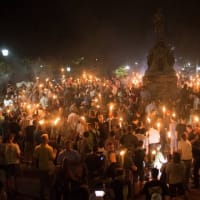
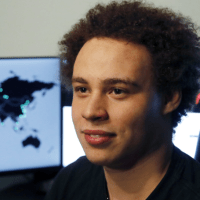
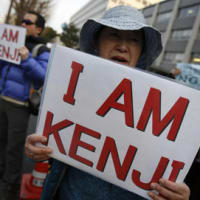
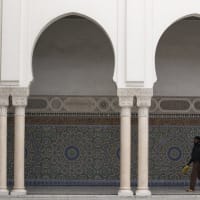
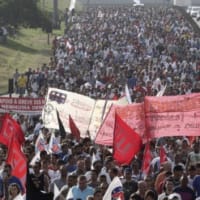


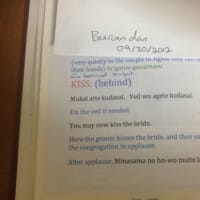
※コメント投稿者のブログIDはブログ作成者のみに通知されます